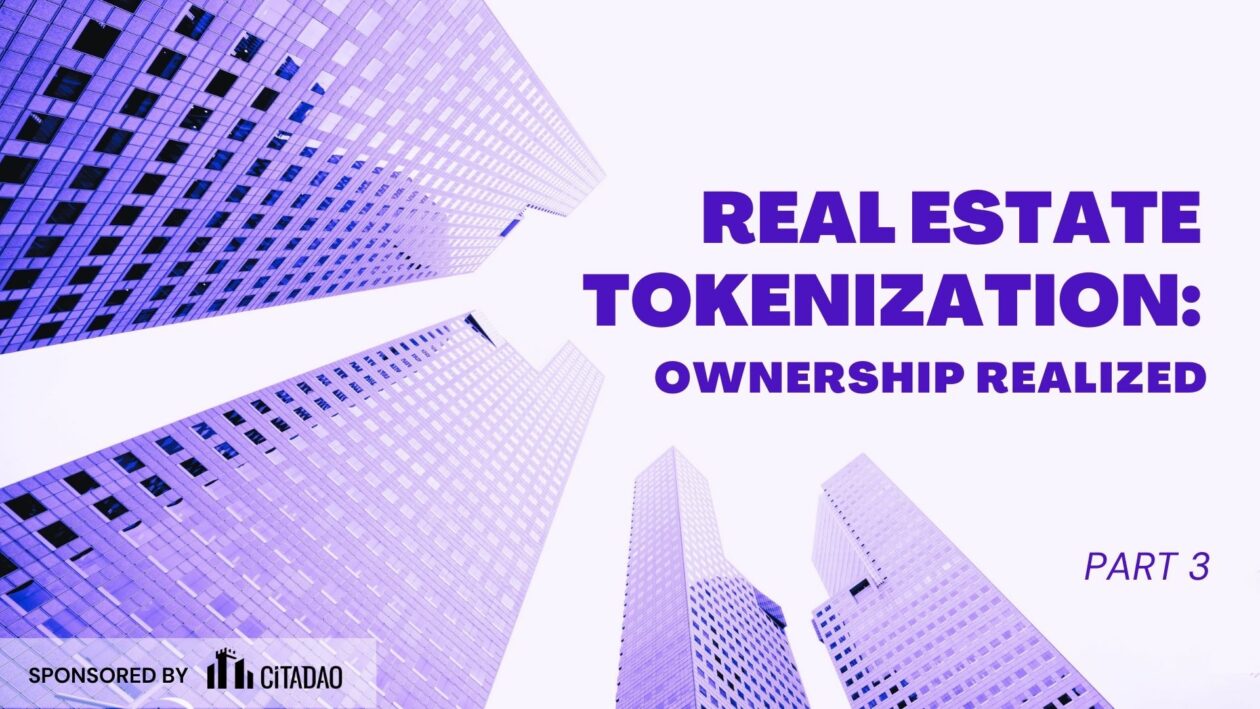This is the third article in a special Forkast series, Real Estate Tokenization: Ownership Realized. Learn more about this series here.
When the artificial intelligence chatbot ChatGPT burst into newspaper headlines last month, it caused a bigger stir than many new technologies. That’s hardly surprising since the people reporting on it were the very people whose jobs the new AI tool appeared to be imperiling – namely, journalists and other individuals whose professions involve writing.
The application of such technology to a field as human-centered as writing may have taken some by surprise, but few industries have escaped automation in some form, and the real estate sector is no different. Consider, if you will, the way in which you look to buy an apartment. A dwindling band of holdouts may traipse around property agents, looking at what they advertise in their shop windows, but for the overwhelming majority of property purchasers, the first stop is the internet.
As the phenomenon of internet-based property platforms enters its fourth decade, the user experience has become smoother and more sophisticated, but, aside from a degree of market consolidation that would likely have occurred anyway, its basic characteristics have remained unaltered.

The advent of tokenization in real estate, however, has been touted in some quarters as set to turn the business of property buying and selling on its head, in part thanks to the potential that blockchain technology has to slim down the roles of the many intermediaries involved in real estate transactions.
Gain and pain
In any given property purchase, various parties are typically involved alongside the buyer and seller – real estate agents, lawyers, appraisers, surveyors and others. As proponents of real estate tokenization seek to emphasize the cost savings to be had as a result of bringing some of these functions on-chain, however, trade-offs become apparent.
Christine Li, head of research for Asia-Pacific at international real estate agency and management company Knight Frank, said one of the reasons blockchain-based tokenization hadn’t yet grown to become a major component of the mainstream real estate market, despite having existed for more than six years, was precisely because of the lack of established processes and personnel to execute them.
“When you put things on blockchain, you actually don’t have any back-end support,” she told Forkast, quickly pointing out that market participants armed with adequate knowledge could nevertheless benefit from lower costs.
“Token holders don’t have to incur fees when they trade real estate, unlike on exchanges, where, for example, if you buy REITs [real estate investment trusts], you have to pay exchange fees,” she said. “And when you actually put your REITs onto the stock exchange, the exchange can charge third-party vendors a fee. They can actually use your collateral to make money, so you lose out on that.”
Lawrence Peh, an independent director at Hong Leong Bank Vietnam and an adviser to the board at Hoa Binh Construction Group, said tokenization could help not only to reduce such overheads, but also address vulnerabilities in property transactions arising from misconduct by lawyers and other parties who could “run away” with investors’ funds.
“Those are system inefficiencies, and they’re not inefficiencies that should be allowed to remain,” he told Forkast.
Humans in the loop
Yet despite the potential of blockchain to reduce costs and instances of abuse, other fixtures of the market appear set to remain irreplaceably human.
“Property, compared to other asset classes, is very fragmented because it’s very local,” Andy Yiu, head of corporate finance at Hong Kong-headquartered investment holding company BOA Financial Group and a cofounding vice president of the non-profit PropTech Institute, told Forkast. “Practically, even if you put everything online, we still need local experts to tell you what’s good and what’s bad and what’s special.”
Alvin Ngo, a director of mortgage underwriting at Edmonton-headquartered Canada ICI Capital Corporation, also emphasized the role of local market knowledge and said blockchain technology would supplement it and add efficiency, but could not replace it.
“To be able to trade and buy and sell real estate, you need to be in the market – that’s first and foremost,” he told Forkast. “When we have a lot of real estate tokenized on-chain, you’ll have the option to buy into basically any real estate you like, anywhere you want to. But how do you know what’s good to buy into? You need local people who can tell you exactly how property in that market is doing. Blockchain is just blockchain – it doesn’t tell you what’s going on day to day like people who are living in that market.”
Xian Yang Wong, head of research for Singapore at global real estate services firm Cushman & Wakefield, said intermediaries – brokers and appraisers, in particular – would still be required to provide a basis for property values and to underpin investor confidence.
“Tokenization platforms can work with brokers to help source for real estate to tokenize,” he told Forkast. “Brokers can help bridge the knowledge gap for tokenization and provide market advice to complement the process of tokenizing property assets.”
Yiu also said he saw an ongoing need for intermediaries and the expertise they brought to the market, which he said was likely to change as tokenization developed.
“My vision of the future of tokenization would be where, instead of agencies or middlemen being eliminated, they evolve – they have their roles transformed,” he said. “Rather than giving you a sales pitch, they function as consultants and advisers, selling tokens – they still sell, but they just don’t sell in the old way, because real estate is such a fragmented, very localized market. Technology is one thing, but at the end of the day, it’s really human to buy and sell.”
Peh echoed that view, saying: “Tokenization will not put anybody out of business,” he said. “Even without tokenization, people in any profession who are not open to adaptation will put themselves out of business.
“Real estate agents will still bring us to visit properties – they’ll still have the same role to play,” he said. “They just have to innovate and move with the times and understand it, and all their skills will all be actually very well enhanced and appreciated, so it’s really a transformation of roles, and their skill sets will still be used, but they’ll just be transformed and used differently.”
Ngo said that in addition to agents and brokers, tokenization would require changes in the roles of property finance professionals and lawyers.
“In order to tokenize a property, you probably need to clear up any third-party interests, so does that mean the role of financial advisers will just fade away?” he asked. “I don’t think so. Just the process will begin to change. Everyone can have the freedom to choose the amount of debt they want to have on a property, so you may want to have 50% leverage, or if you’re wealthier, you may want 85% leverage – so if anything, it expands the market, expands the customer base. Instead of being driven out of business as an intermediary, you’ll need to up your game and improve your knowledge.”
Yiu emphasized that the presence of intermediaries was not only necessary in practical terms but also desirable for the development of tokenization itself.
“Another reason why I don’t think we can cut out all the middlemen and intermediates is that in order to get a new product widely adopted, you need to have the existing stakeholders in the ecosystem,” he said.
Expanding universe
Wong said that the tokenization of real estate had the potential to increase the size of brokers’ and agents’ addressable market.
“Because tokenization offers an alternative universe for the sale of fractional ownership of assets, it expands the universe of available stock for sale, which could increase property sale brokerage activity,” he said.
Ngo was even more bullish, pointing to the potential of tokenization to extend the internationalization of real estate markets.
“The market will expand – it’ll be a global market instead of just the local market that you might have been in before,” he said.
Li was also upbeat on the prospects for increased sales activity, saying: “Tokenization is going to be another avenue for intermediaries such as agents and brokers to help landlords unlock more value and better liquidity from their properties,” she said. “It will definitely not put them out of business.”
She said, however, that tokenizing real estate would not suit all buyers, sellers, or property types.
“I don’t think it’s for the masses – but it does have value, because you improve the liquidity of the market,” she said. “And when you have liquidity in real estate, it becomes more valuable, particularly less liquid real estate assets.
“The market for real estate tokenization is huge, even for intermediaries like Knight Frank, because we don’t cover the entire market spectrum. We focus mainly on Grade A and B properties, but there are lots of owners in the Grade C category, and nobody is helping them to improve the liquidity of their real estate.”
As it becomes clearer what kinds of changes tokenization has the potential to bring to one of the world’s most venerable asset classes – and to the numerous professionals in related industries – so too will the need for rules to undergird it.





